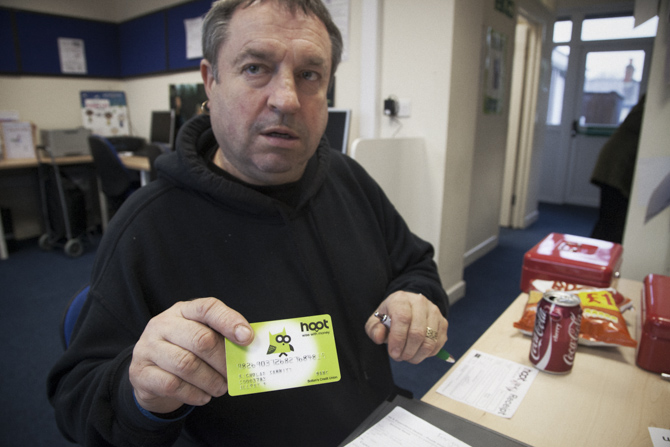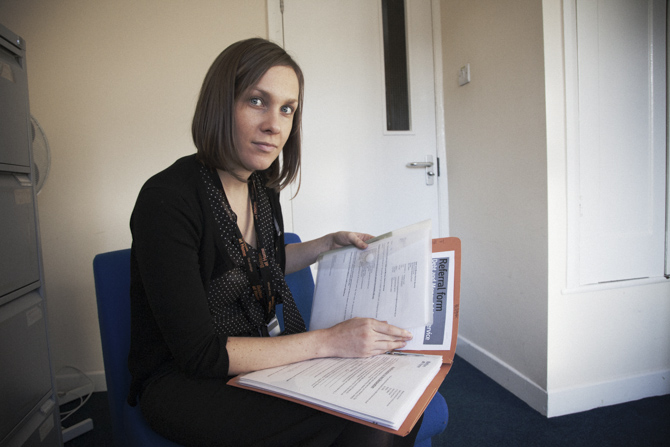It’s pelting down and everyone who comes into the front office this morning looks like a drowned rat.

Today is money day again at the UCAN. The place is only open for those who want to see the local credit union, Hoot, or have an appointment with Dawn from Money Skills. Oh, and Jade is upstairs waiting to see her ‘Think Positive’ clients.
Hoot’s first customer is early. Nick has come to make his regular loan re-payment and, as Steve from Hoot has yet to set up his stall in the corner of the front office, I grab my opportunity. “Can I have a chat… about why you use the credit union?”
“You can ask me what you like,” says Nick, happy to help. “I could tell you my life story if you’ve got time.”
I suggest there might not be enough tape in my recorder and instead ask him how long he’s been with Hoot. “Three years. And I’ve had a new loan off them each year. Every fortnight I pay off some of the loan and put something into a savings account. They use people’s savings to give out other loans.”
Nick explains that he uses Hoot as a way of budgeting across the year. The loan he takes out each October pays for Christmas and it takes him 12 months to pay it back, then he takes out another.
“What is your income, are you on benefits?”
“I get child benefits, family tax credits and employment support allowance, and that’s because I’m under the Mental Health Act, I’ve been under them for 20 odd years.”
“They’ll only give you what they think you can afford to pay back. Before they start they work out what money you’ve got coming in and what your bills are and that.
“If this wasn’t around where could you go?”
“The only other thing is a budgeting loan from the Department of Health and Social Security, [now the DWP].”
“And what about loan sharks? Have you had any experience of loan sharks?”
“I’ve used three or four of them in the past. But, If you borrow £100 they’ll be asking for £250 back,” he says. “They always want more from you. That’s what they do on this estate, they prey on people on ‘social’. They’ll go to the door and say you can have a £200 cash loan and there won’t be many – especially at this time of year – who won’t take it.”
“What if you don’t pay it back?”
“The official ones – the likes of Shopacheck and that – they’ll just send someone round from head office but there are others that’ll send the heavies round… give you a few slaps. You know what I mean?”
Steve is ready now.

Nick has his card, and his payments, and all the receipt slips from his fortnightly visits in a plastic folder. “I always keep it organised,” he says. “So here’s £30, that’s £28 off the loan and £2 going into the savings, right?”
“Okay,” says Steve, filling out another receipt form.
“And here’s what they do,” says Nick, “showing me a kind of income and expenditure analysis that he’s had to complete before getting his loan. “They won’t give you the money unless they know you can pay it back.”
“Is he your best customer, Steve?” I joke.
“He’s a good customer.”
“And I get a pen every time I come in!” laughs Nick, picking up one of the Hoot pens off the desk.
“He pinches one every time he comes in!” laughs Steve with him.
There’s talk in the kitchen about a football game tomorrow. Carl has been encouraging local men to come down to a weekly lunchtime kick-about organised by Bolton at Home and Bolton Wanderers.
“You could come too,” he says as he gives me a leaflet. I’m not sure whether he means to play or to watch. Hopefully it’s to watch.
“I will,” I say, “maybe not tomorrow but I’ll come down some time and take some pictures.”
Dawn from Money Skills is in the small office next to the kitchen. Her first client has just texted to say she’ll be late – her son has been sent home from school. “Can I ask you a few questions while you are waiting?” I ask.
Dawn agrees and starts by explaining that Money Skills is a confidential, impartial money advice service to help people on low incomes with budgeting, banking and saving, and even energy efficiency.
“So why are you here, at the Breightmet UCAN?” It sounds a bit rude but thankfully Dawn understands what I’m getting at.
“We have offices in town but, of course, we realise that those with money issues can’t always afford the bus fares. We position ourselves in the community so people can access us easily.”
Dawn has been giving Bolton residents money advice for the last seven years. “But now there is more demand than ever,” she says, “and it’s getting tougher. In the past there were always things we could do to help customers. Now, with the welfare reforms, there are going to be some customers that will still struggle no matter how much we maximise their income and minimise their expenditure. There just isn’t enough money coming into the household to support them.”
“What’s changed in particular?” I ask.
“The bedroom tax is proving very difficult. If you’re a single person or you’re on Jobseeker’s Allowance then there’s not much slack. Finding another 11% of your rent [for one extra bedroom] can be quite substantial for someone who’s only receiving £71 a week.”
“The government would say that Universal Credit will make things more straightforward,” I suggest. “Will it make it easier for people to manage their money?”
“Despite all the publicity a lot of people just aren’t aware of it,” says Dawn. “They will only get their money once a month and they might not have anticipated that. And it will be paid in arrears so there will be a period when there will be no money coming in until the payment reaches them.”
“So, when it’s introduced, do you mean there will be a gap in people’s payments?”
“Depending on their payment date, yes. We are trying to warn people about that. They really need to be thinking about that now and maybe put, say a pound a week away, so they have some money built up for when it does affect them. There’s a lot to think about.”
I’m intrigued by Dawn’s work. She’s right at the sharp end of the reforms, trying to help those at crisis point. “If you see someone who is obviously not coping, what do you do? What can you do?”
“We have to gather all the facts: find out where they live, whether or not the rent is being paid, what benefits they are claiming. We are seeing quite a few clients now who have had their benefits stopped – they’ve been sanctioned by the JobCentre for some reason – and are on nil income. We need to find out why and try to resolve that quickly.”
Dawn says she tries to put things on hold for those clients. She’ll talk to their landlord – often Bolton at Home – and their utility companies and ask for breathing space, time to get things sorted.
“If clients have no money for food, which is usually the case, we have links with all the food banks around here. We can give them vouchers whilst we are trying to get their finances sorted.”
“Have you seen more food banks set up since you started?”
“Oh gosh. There were no food banks when I started. Now there are lots, and they’re all in high demand. We do have some emergency food parcels back at the office because the local food bank is only open once a week. So we might have to organise for an emergency parcel to be delivered until they can go to the food bank.”
There’s a gentle knock on the open door. I make way for Dawn’s first client of the day.
There’s lots going on in the front room this morning. Bags of soil and stacks of flower pots Vanessa and Carl are discussing whether the bulb planting activity they have planned for later should be out the back or on the pavement at the front. They agree they might attract more people if it’s at the front.
There’s a new member of staff in the kitchen given away by her Bolton at Home lanyard. I introduce myself to Hayley who, it turns out, is a debt advisor. I’ve only just written about Money Matters, the borough-wide debt advice service, and wonder why there’s another one. Seems places like Breightmet can’t get enough money advice.
We takes our mugs into one of the small offices upstairs and Hayley tells me their service, just 15 months old, was set up specifically to cope with the anticipated demand from their customers as the welfare reforms were rolled out. “Although we’re part of Bolton at Home, we’re impartial and we help our customers with all their debt issues.”
“So you’ve seen the direct effect of the cuts and the reforms? I suppose the bedroom tax is a big one?”
“Oh yes,” says Hayley. “People have had to make some serious decisions. Are they willing, or able, to downsize, or are they able to pay the extra from the money they have coming in? We can look at their expenditure on food and fuel to see if they can reduce that a little to free up some money to pay the under occupancy charge.”
“So your customers are having to spend less on food and fuel so they can afford the bedroom tax?”
“Yes, they are.”
“And in Bolton, is there enough housing stock of the right type to re-house customers?”
“That’s really not a question from me but realistically, no. If everybody who was under occupying, turned to us and said they were willing to move then no, we wouldn’t have enough of the right properties to move them to.”
“And then, on the other side of it, do you have an unmet demand from families who are waiting to take on those larger houses?”
“Again, I’m not the right person to answer that question but I suspect not. Ultimately this change is going to have the biggest impact on the customer, but also we as a housing organisation are affected because we’re going to have a lot of properties we’re unable to let.”

Thinking it must be soul-destroying listening to tales of unmanageable debt I ask Hayley what she gets out of it.
“For me, personally, I find debt advice very rewarding. As advisors – there are six on our team – we find a lot of customers don’t know the difference between priority and non-priority debt. They are making payments to non-priority debts well in excess of the amounts they should be paying.”
“I’m not sure either… what’s a priority debt?”
“One that has serious consequences if you don’t pay. So not paying the rent could lead to eviction, not paying council tax could lead to imprisonment. But the doorstep lender, who gets £20 each week because they come knocking on the door, can only threaten you with the bailiffs.
“The relief on people’s faces when you explain the difference and tell them you can work on their behalf to try and reduce or put on hold the non-priority debt, is very rewarding. We’ll write to the doorstep lender, explain the customer’s position, and that can really reduce the stress they are under.”
to be continued…
Rob is telling me about the four clients he has seen this morning. Two of them have issues around the bedroom tax or, as he correctly calls it, the under occupancy surcharge.
“For this one client, it is particularly difficult,” he says. “He’s living alone in a three-bedroomed property and so his housing benefit has been reduced by 25%.”
“And what’s his income?” I ask.
“He’s on Employment Support Allowance,” says Rob, “which is just over £100 a week, so he’s potentially using a quarter of that for the rent.”
“Potentially?”
Turns out this customer is quite clued up. He’s already applied for, and been awarded, a Discretionary Housing Payment (DHP), an emergency pot given to each local authority to mitigate the effects of the bedroom tax, erm, under occupancy surcharge.
“But that’s temporary isn’t it?” I ask. “Designed as a stop gap.”
“It is. When it runs out he can make another application but there’s no guarantee he would be awarded a further payment.”

Before he became a full-time adviser four years ago, Rob was one of the Citizens Advice Bureau’s band of all-important volunteers. As well as money management, his 14 paid colleagues cover welfare benefits, housing, immigration and community care from their main office in Bolton town centre.
Every Monday morning he comes to this UCAN, sits in the small upstairs office and for two hours listens to the problems of Breightmet.
“This particular client,” Rob continues, “is downstairs on the computers pretty much every day. He’s making a lot of effort to find somewhere smaller so he can downsize.”
“But now he’s getting worried? It’s not his fault, is it?”
“No, it’s not and that’s the problem. With the under occupancy surcharge, we’re noticing that there are lots of people wanting one-bedroom properties but they’re just not available.”
“So,” I say, playing devil’s advocate, “let’s extrapolate. If this man has used all his DHP chances but still can’t find another place, then what?”
“He’s with a housing association – not Bolton at Home, I should say – and if he fell into arrears then they would have the right to take possession.”
“So he could be chucked out?”
“Hopefully it wouldn’t get to that, but yes, he could get evicted.”
“So, let’s just say he did, then what?”
“He’d make a homeless application to the council and, if he was deemed a priority because of his health, the local authority would have a duty to find him temporary accommodation – a hostel maybe – before they found him something permanent.”
“But that’s what he’s trying to do already. And all that costs money.”
“It’s unlikely to get to that. But it’s true, with pretty much everyone we see it’s not a case of them refusing to move, it’s a case of there not being any of the right sort of properties for them.”
For Breightmet customers it must be reassuring to get advice from someone who knows their way around welfare and housing bureaucracy, someone who will advocate on their behalf, write a letter, make a complaint. A bit like having an ally in often very unfamiliar territory.
“And Rob, how have things changed in the time you’ve been an adviser?”
“In the past I’d complete financial statements with clients and we’d find that their benefit would just about cover the basics: utilities, food, TV licence and a bit for travel.
“Now, with the cost of everything going up, financial statements are showing a deficit of £20 or £30 a week. Benefits are simply not sufficient to cover outgoings. So clients are having to make the decision about whether to put the heating on or buy food. It’s got to that.”




